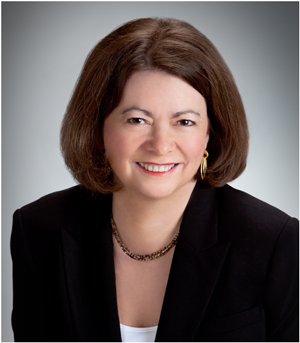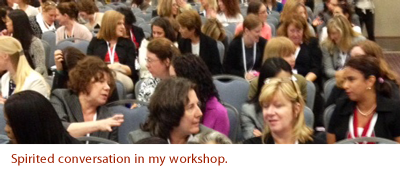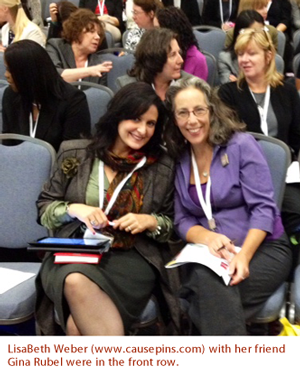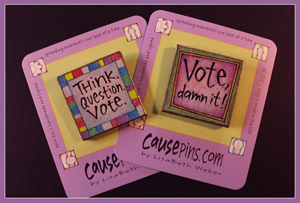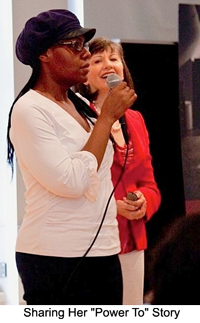Gloria Feldt's Blog, page 15
October 10, 2012
She’s Doing It: What’s Your SQ? Cindy Wigglesworth Reveals Its Leadership Power
I’m thrilled to highlight the wonderful Cindy Wigglesworth via her guest post for this week’s “She’s Doing It” column.
Cindy is president of Deep Change, Inc. and the author of the just released must read for any leader, SQ 21: The Twenty-One Skills of Spiritual Intelligence
. Her ideas about this third dimension of leadership will send you deeper into your own thinking about how you can lead most effectively and authentically.
Multiple Intelligences and the Woman Leader
Women tend to score higher than men in emotional and spiritual intelligence. We have a natural tendency to develop skills the world desperately needs. Imagine what capitalism could look like if multiple intelligences were used in decision-making. Imagine if long-term good for future generations and the planet mattered to our corporations as much as or more than short-term gain. Women tend to balance these things more easily than men. So why don’t more women step into leadership roles?
IQ is our classic measure of mental intelligence. Recently, women have begun to lead men by about 5 points. Years of research into EQ (emotional intelligence)[1] has shown that IQ is “not enough” to succeed in any field. But if you have enough IQ and technical training, then EQ becomes the next differentiator of success. In other words, assuming enough IQ, if you have EQ you are more likely to succeed.
There are 18 skills of EQ in the Daniel Goleman/Richard Boyatzis model. Their Emotional Competence Inventory is the “gold standard” assessment in the EQ world. These skills include empathy, where women tend to excel. Men, in my experience, use willpower as a first-choice method to control their emotional outbursts. They suppress feelings rather than gain insight in how to manage them. Women tend to notice how they are feeling and more easily learn to reflect on the “why” behind it. Healthy self-reflection helps with EQ and SQ. Good EQ creates the ability to influence others, work well in a team, and be trusted as a leader.
Women seem to start out with a stronger baseline EQ, perhaps due to brain differences, hormone differences, and social training. This gives us a significant gender advantage, if we use it.

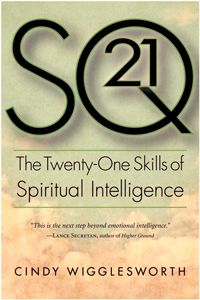 What is spiritual intelligence (SQ)? I define spiritual intelligence as “the ability to behave with wisdom and compassion, while maintaining inner and outer peace, regardless of the situation.” There are 21 skills of SQ in my model. Each skill can be self-assessed from “novice” to “expert” level. And each skill can be developed if the leader chooses to do so.
What is spiritual intelligence (SQ)? I define spiritual intelligence as “the ability to behave with wisdom and compassion, while maintaining inner and outer peace, regardless of the situation.” There are 21 skills of SQ in my model. Each skill can be self-assessed from “novice” to “expert” level. And each skill can be developed if the leader chooses to do so.
SQ is a new field and research into the leadership advantages of SQ is in its earliest stages. What I know from my own life experience and from working with clients is that SQ is like EQ on steroids. It moves us from being good at influencing to being inspirational. It moves us from empathy to compassion and profound humility. It moves us from operating from ego to operating from our highest, noblest self. With humility comes an openness of perception, whereby we can see new information. Other people’s perspectives become helpful input to a holistic view as opposed to being “right” or “wrong”. With a more open and expansive mind, we can start perceiving subtle patterns in systems and across time that we might have not noticed before. This helps us make better decisions. With high SQ comes an ability to stay calm and centered – crucial if we are to make full use of our IQ skills and make optimal choices under pressure. (Note: both men and women can excel in EQ and SQ, as these are learnable skills.)
Women score higher, on average, than men on 14 of the 21 SQ skills. You would think that with a natural advantage in EQ and SQ, and a slight advantage on IQ, women would be taking at least 50% of the roles as leaders. We could be bringing these much-needed multiple intelligences to the workplace and to politics. Yet we do not see this happening in representative numbers. Our skills could bring us power to influence the direction of the future. Why don’t we use them?
I think we get in our own way. While there are still some structural inequities in our modern systems, our biggest barrier now is that women tend to avoid using power because of our aversion to its possible misuse. We rein ourselves in and fail to lead where we could. We even shape our bodies to look “smaller” when a “power posture” could instead raise our testosterone levels, increase our self-confidence, and give us instant social power.
In my experience, self-aware and self-confident women who lead their own lives with grace and power are more likely to attract mature and confident mates, friends, co-workers, customers and investors. Who doesn’t want that?
As Gloria Feldt says, power unused is power useless. It is crucial that every brilliant mind, heart, and spirit on this planet, regardless of gender, step into the most useful roles we can. The world needs each of us. We have skills the world needs. We need to overcome our historical programming and use our IQ, EQ, and SQ in service of the greater good of all.
[1] See Working With Emotional Intelligence, Daniel Goleman, 1998
October 3, 2012
They’re Doing It: PA Conference for Women
Strategies to Redefine Power and Lead with Intention
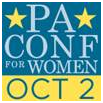
The largest women’s conference in the state of Pennsylvania, the PA Women’s Conference, once again lived up to its reputation. 6,000 women came together in Philly to connect, share information and inspiration.
Enjoy these pictures taken as I presented my workshop and enjoyed the rest of the day attending sessions and networking.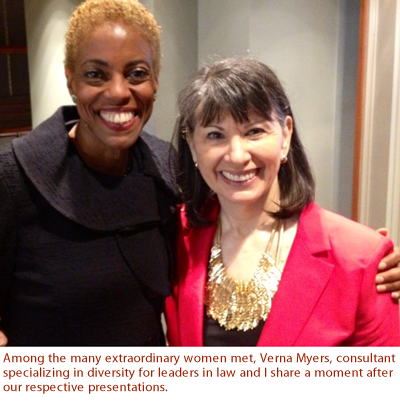
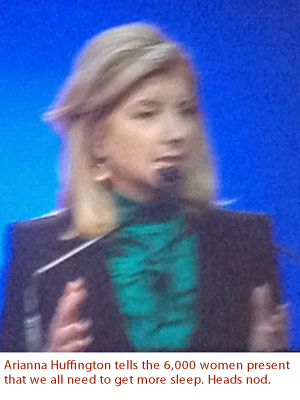
October 2, 2012
Top 10 Leaders Active on Twitter
To me, a leader is somebody who gets something done. And while we make choices about what level and responsibility we take on as leaders, I believe that the most important leadership values are honesty and courage.
I was honored recently to be included as one of the Top 10 Leadership Experts to Follow on Twitter. Career Bliss writer Ritika Trikha compiled the list, which appears below.
But wait. Something was missing. Mine is the only female name on the Career Bliss list. Surely there are many terrific women who are leadership experts.
Let’s create our own list of women who ought to be on this or any other top leadership expert list. I’ll start with Bonnie Marcus whose GPS Your Career is brilliant.
Share your recommendations in the comments! If enough are recommend, we can give the list a name and publish it as the definitive Top 10. Why not?
If you’re looking to add brilliant, thoughtful advice into your Twitter stream, look no further! Below, you’ll find a list of the crème de la crème leadership experts who are super active on Twitter. They are a must-follow for anyone looking to be a leader at work! Check ‘em out.
Drum roll please …
1. @Bill_George
He’s a Harvard Business School professor, former Medtronic (medical device technology company) CEO and author of several bestselling leadership books, including 7 Lessons for Leading in Crisis. An avid Tweeter, he’s regularly sharing great insights, like a recent Tweet says “Inc. argues office hierarchy is good thing for business. I disagree: teamwork and collaboration are key to success.”
This account is also known as Dave Ramsey’s personal business playbook. He’s the New York Times bestselling author of Entreleadership in addition to radio host, television personality and motivational speaker. His feed is bursting with wisdom, like EntreLeader’s best hiring practices!
Dwight Frindt is the co-founder of 2130 Partners (leadership and development firm) and Vistage Intl. (an executive coaching and peer advisory group). He’s also the co-author of Accelerate: High Leverage Leadership for Today’s World.
4. @GloriaFeldt
Gloria Feldt is a renowned speaker on leadership and the author of No Excuses: 9 Ways Women Can Change How We Think About Power. Her personal insights, the article she shares and her network of like-minded amazing leaders are enough to make her a valuable asset in your Twitter feed!
5. @GTDGuy
Headed up by productivity expert David Allen, he’s not directly Tweeting about leadership, per se, but his tips, insights and links to management techniques are essential for any aspiring great leader! Allen created a system of organization and task management called GTD that many leaders swear by.
Dough Sundheim heads up the leadership column in Fast Company. He’s also an executive coach and organization consultant. Sundheim is always posting not only personal insights but also fascinating articles from a variety of publications, like “How to Manage Your Team with Positive Psychology in The Glass Hammer.
Michael Hyatt is the author of the New York Times bestseller Platform: Get Noticed in a Noisy World. Hyatt shares insights via links to articles, third-party sites and even his own podcast. A recent tweet says: “In my next podcast, I’ll be talking about how negativity can heart you. Have questions? Leave me a VM.”
8. @RandyConley
He’s constantly posting a flowing stream of insights on leadership. For instance, shortly after the passing of Neil Armstrong, they posted a link to “Five Leadership Lessons from the Life of Neil Armstrong.”
Author of No.1 bestseller The Leader Who Had No Title is an amazing inspirational resource. He’ll fill your feed with daily must-have reminders, like “a Giant goal without pristine discipline is an empty promise.”
10. @TonyRobbins
Tony Robbins, life coach, offers great resources on leadership, especially by regularly offering insights on some of our greatest leaders today. For instance, he recently RTed an interview and tribute of the late Stephen Crovey. Other Tweets talk about Warren Buffet and Steve Jobs.
September 26, 2012
She’s Doing It: LisaBeth Weber Pins Pack Message Wallop
LisaBeth Weber tells how we met in this guest post. So I’ll tell you she is a woman with a vision. A vision that exemplifies No Excuses Power Tool # 8: Employ Every Medium.
And if a leader is someone who gets something done, then LisaBeth exemplifies leadership too. She uses the power of her artistry to make a difference for the causes she—and YOU—believe in. When you or I wear one of LisaBeth’s cause pins, we’re also using Power Tool # 6: Wear the Shirt –showing the world what we believe.
I’ll bet LisaBeth would love to know what you want on your pin, if she were to design one for you. So tell her in the comment section below.
How do I know Gloria? Our paths were destined to cross, and they finally did back in 2004 at a campaign event in Pennsylvania. Having defined a mission of making a difference in the world over 20 years ago, I’ve always channeled my core beliefs into my work. It seems inevitable that my creativity and mission would manifest into a line of handmade pins for causes that began with a pin about CHOICE.
As an artist and activist, I realized that an art-pin could be like a mini-billboard for people to ‘wear their heart on their lapel’, to spark conversation, and to effect change.
Over the years, I developed cause pins for politics and voting, peace and social justice, women’s rights, the environment, animal rescue, and more. The pins found their way to many non-profit organizations that have utilized them for fundraising and awareness.
Eventually, my pins were seen on some notable lapels, including Hillary Clinton, Gloria Steinem, Madeleine Albright, and yes, Gloria Feldt!
The inspiration for the pin themes often comes from what is happening in the world. In the case of the voting pins, it was about what wasn’t happening. I began to see a heartbreaking trend where more people were voting for American Idol than for President of the United States.
Not one to sit still, I decided to create a line of voting pins, and honor women like Susan B. Anthony, Elizabeth Cady Stanton, and Alice Paul. And a not so well known woman, my mother; a 1970’s single mother and feminist who brought me into the voting booth as a young child, instilling the meaning and value of voting to me at an early age.
I felt an overwhelming sense of responsibility to do my part in carrying on the legacy of these amazing women and the suffragist movement, and not waver in reminding both men and women how important it is to vote.
During the 2004 campaign, I met many young people under the voting age who were effecting more change by getting out the vote than some people of voting age who refused to vote at all. This was an amazing observation and only gave me more resolve to continue.
I created pins like, ‘Vote, Damn It!‘, ‘Think. Question. Vote.’ And ‘Vote. It Still Matters.’ Earlier that year, I created a pin for the March for Women’s Lives which led to meeting Lorraine Cole from The Black Women’s Health Imperative. Lorraine chose the Vote, Damn It! pin for their National Vote Campaign. To this day, that pin elicits the strongest reaction from people, along with Think. Question. Vote. which teachers and others who need to be neutral at the work place can still wear proudly.
The diversity of my work reaches past pins and into varied areas of advocacy, marketing, and media, through being a performing songwriter, freelance writer, speaker, and working in film. This has allowed me to cross paths with many leaders who I respect and can learn from.
I look up to women like Gloria who walk the walk of empowerment, change, social justice, intelligence, and worth. She is a force who helps women to look inside themselves and discover the value and self worth they so richly deserve.
I have immense gratitude for those who desire to lift us up and this has carried over to my close group of women friends who do this for each other on a regular basis, providing a powerful force for inspiring one another through the challenges of life.
New Hope, Pennsylvania artist, writer, musician, and creative biz consultant LisaBeth Weber is a modern Renaissance woman who makes a difference in the world through her work.
Known for her popular and unique handmade CAUSE PINS, LisaBeth is a creative business advocate and consultant who offers guidance, training, and speaking programs to help businesses see how important creativity is to building business.
She is currently working on a book about this topic. LisaBeth also serves on the Board of Directors of the Women’s Business Forum and is a cancer survivor.
LisaBeth’s pins are available wholesale and retail at www.causepins.com. Custom pins are also available. Pins are 1.5″ square on a wood backing, signed, and delivered on a colorful display card.
September 19, 2012
She’s Doing It: Ora Shtull, 9 More Ways to Power Up
Executive leadership coach Ora Shtull understands the power of using your voice. In her lively guest post and the accompanying video, she tells women that it’s not enough to sit at the table; talk at the table if you want to have an impact on decisions and be recognized for your ideas. When I was writing No Excuses, I came to realize that power unused is power useless, and unless we are sharing our knowledge and ideas, they are not helping anyone, including ourselves. So, here’s how Ora tells it:
What is it about nines? Nine is the number of lives that cats are said to have. The Beatles sang “Revolution 9” on their White Album (in almost nine minutes!). And when you look pretty darn good, you’re “dressed to the nines.”
Gloria Feldt likes nines, too. She’s written a bestselling book called No Excuses: 9 Ways Women can Change How We Think About Power in which she brilliantly enumerates nine important ways women can embrace their power.
It’s no secret that I am a big admirer of Gloria’s work. Her rise from teen mom and high school dropout in rural Texas to CEO, author and acclaimed expert on women and power is nothing short of extraordinary.
Coincidentally and perhaps cosmically, I too have a belief in nine. Working with professionals in New York’s leading companies for nearly two decades as an Executive Coach, I discovered a direct correlation between nine executive behaviors and success – thriving at your job, being promoted, and making smooth and seamless transitions. I studied and identified these critical behaviors and developed a model called the Leadership Presence Coaching Model, which has become a critical tool in helping my clients. I also discovered that women have unique challenges in the workplace and I’ve become dedicated to helping women soar professionally.
My recently released book, The Glass Elevator: A Guide to Leadership Presence for Women on the Rise, helps you master the 9 must-have skills that will propel you upward. And yes, it has 9 chapters!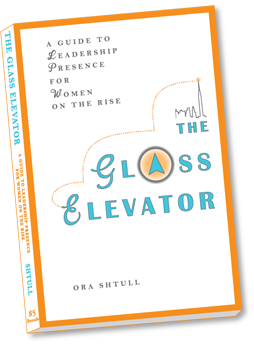
One of the things I’ve witnessed as an Executive Coach is that women often shy away from challenges because they lack confidence, while the men take the plunge more fearlessly. If you’re a bean counter and don’t take risks, you’ll always be a bean counter. If you have dreams, forsaking risk will leave you professionally stuck.
But let’s face it – taking risks doesn’t come easily to most people. Eleanor Roosevelt (first lady, author, speaker, politician, and civil rights advocate) once said: “You must do the things you think you cannot do.” You may be surprised to learn that despite all of her accomplishments, Eleanor was far from fearless. In fact, she was proud to admit that she was compelled every day to do something that scared her.
It’s your turn to take the plunge. Start by trying something new and different. I suggest you explore something in your personal life as a parallel growth experiment to your workplace adventure. Then keep your eyes peeled at work for any opportunity to accept a challenging assignment, new project, or role on a special task force.
Companies value professionals who welcome challenges. Leaders hold in high regard professional women who are willing to take on new responsibilities, who are open to testing the waters of the new and different, and who are well rounded.
Offer your time and talent, despite your apprehensions. Remind yourself that mistakes are terrific learning opportunities and line up the resources and support you’ll need to succeed.
When you take risks, you’re stimulated. And when you’re stimulated, you grow professionally.
And that will make you mighty powerful.
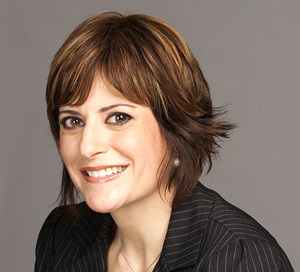 Ora Shtull is an Executive Coach who has worked with high-potential leaders at Fortune 100 companies for over 15 years. Ora’s recently published book, The Glass Elevator: A Guide to Leadership Presence for Women on the Rise, shares the must-have skills that propel women upward. To learn more about Ora’s work, visit: http://oracoaching.com
Ora Shtull is an Executive Coach who has worked with high-potential leaders at Fortune 100 companies for over 15 years. Ora’s recently published book, The Glass Elevator: A Guide to Leadership Presence for Women on the Rise, shares the must-have skills that propel women upward. To learn more about Ora’s work, visit: http://oracoaching.com
September 12, 2012
She’s Doing It: Carolina Pichardo Leads Young Urban Moms to See They Are Not Alone
“Before I got pregnant, I was full-steam ahead in life,” said Carolina Pichardo, cofounder with Mary Targia of the educational and inspirational New York-based organization and website YUM (Young Urban Moms). 
“I’d received a partial scholarship to New York University, after traveling abroad and interning at the New York City Public Advocate’s Office and Tor Books Publishing.”
But when she found out she was pregnant, the resulting harsh remarks and judgmental looks threw the slim, stately Harlem-born Pichardo off her track—for a while: “I just became angry. I didn’t know what to do with that anger, so I simply worked hard to prove those around me wrong.”
With some of the same rebel instincts that had propelled her parents to immigrate to the U.S. from the Dominican Republic—where her mother was a teacher and her father a doctor—she stayed in school through most of her pregnancy. She took a semester off after her daughter Lyanna (known as Lulu), now age 11, was born. Then she returned to earn her bachelor’s degree in communications from NYU “with leaky boob stories galore.”
Like so many teens who become pregnant, Pichardo and Lulu’s father tried hard to make it in a relationship. They were engaged for a time, but the pressures of school, work, and parenting were too much. Plus—as I know from being in that situation myself—the stress of being parents before being emotionally mature is immense.
Eventually, Pichardo’s life reached a point where the young woman, who as a girl had been her “parents’ biggest pain” could look back and help others.
I should reveal here that Pichardo and I originally connected at a BlogHer conference in 2010. After I appeared on a panel there, she touched my heart when she wrote this to me in an e-mail:
I’m writing to actually thank you for your keynote presentation. It was inspiring and so great to hear from a fellow-YUM. That’s short for a Young Urban Mom. Although you may not directly identify with that phrase, in our books you’re a strong representation of it.
We identify with women that have gone through that struggle of finding their own identity, while also building those of their children. I’m actually a single mom of one, but I continued to attend school and work as an editor for an various publications. Mary Targia, the co-founder of the website, is the mother of one and also worked full-time as a digital marketing professional. She went on to become one of the top talents on Madison Avenue and founded her own consulting company.
We hope that these stories inspire and motivate young mothers everywhere to accomplish their goals without fear, anger or resentment.
Pichardo’s enormous empathy for other young moms comes of course from her own experience with early pregnancy and parenting, with all the pain and shame and pure hard times that entails. But it also comes from another deep source, as the guardian to her autistic younger brother, and from helping her parents struggle with learning a new language and culture.
Plus, in the “Use what you’ve got” category, otherwise known as the No Excuses Power Tool #3, Pichardo says that because she was always small and slim, she felt she had to compensate with a big brain and smarts—“a strategy that seems to have worked!” she deadpans.
She’s teaching Lulu to trust herself and have the strength to follow her dreams, because, “She’s gonna have to be strong to attain both.”
I had the pleasure of keynoting the first YUMs conference at Uptown NYC September 8th, where Pichardo seemed to be everywhere at once, MC’ing the speakers, making sure refreshments and books were available, and organizing childcare for the children who came with their parents.Afterward, I turned the tables on her (she had interviewed me for YUMs’ website soon after No Excuses was published). I asked her to describe her proudest moment with YUMs.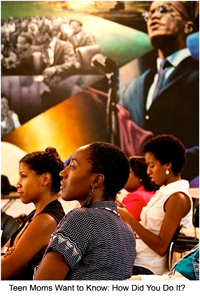
“I would say seeing how many people relate to the mission and message. It demonstrates we were right all along. We [teen moms] aren’t alone at all! 
“I would often not mention I was a mom…fearful that I would be labeled or “seen” differently. It took a lot for me to shed that fear. It wasn’t until I started seeing how many other moms there were, and how I wasn’t at all different from other parents…
“We are always defined by statistics, numbers and research of all sorts but in the end—we are all just mothers. We are mothers who love our kids just the same—if not more, because they provide us with a stronger incentive to fulfill our own destinies.
“That has always been it for me,” Pichardo says with emphasis. “Making sure other YUMs have a platform to share their stories.”
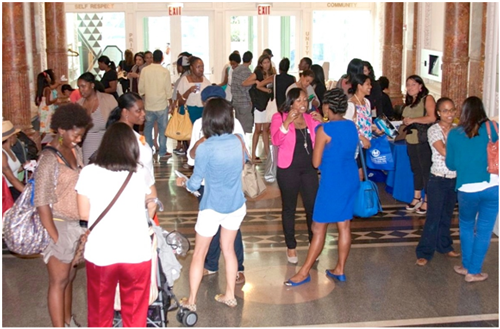
YUMs networking
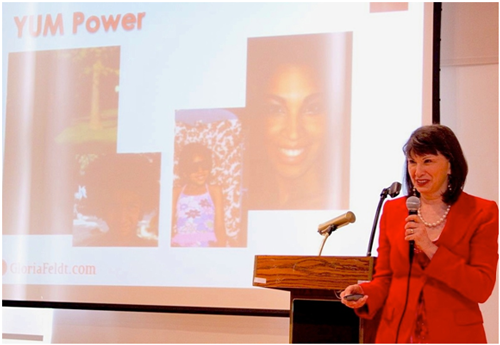
Talking About YUM Power
September 5, 2012
She’s Doing It: Quotes for You by (Mostly) Women Who Inspire Me
Today I was feeling frustrated. I’d been working hard on a project but it wasn’t moving forward. I thought of a quote from the humorist Will Rogers, one I’ve often used when speaking about strategic planning or leadership. He said, “Even if you’re on the right track, you’ll get run over if you just sit there.”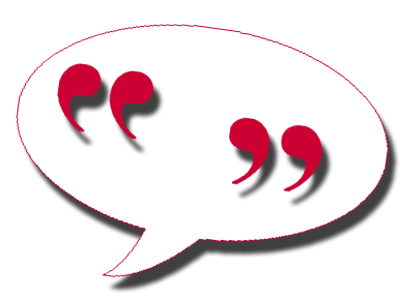
How often do you find that a great quote can inspire you, inform you, give you just the kick of encouragement you need at a particular moment?
Happens to me all the time.
I’ve long collected quotes that speak to me in various files and electronic folders. I turn to them for inspiration and I often share them in writings and speeches. People tell me they look forward to these morsels of wisdom, encouragement, and power. In fact one friend told me she was addicted to the quotes I post on Facebook and twitter.
So I’ve collected the best of of the quotes and shared them on a new page here http://gloriafeldt.com/quotes-that-inspire-me/ Take a gander and see if you find your favorites there.
Quotes like:
“Do what you feel in your heart to be right—for you’ll be criticized anyway. You’ll be damned if you do, and damned if you don’t.” —Eleanor Roosevelt
“It is our choices … that show what we truly are, far more than our abilities.” — J.K. Rowling
“A woman who knows her power has in her hands the key to her own happiness and success.” —Raffaella Barker
“It’s hard to fight an enemy who has outposts in your head.” —Sally Kempton
And probably my all-time favorite:
“Well behaved women rarely make history.” —Laurel Thatcher Ulrich.
Browse the “Quotes that Inspire me” page to find quotes that speak to you. Feel free to use any of them with attribution to their creators. And you can even share these pages in their entirety.
Do you have a favorite quote? E-mail it to me and I’ll add it. I’ll also keep adding new quotes as I find them, so we’ll all have a repository of encouraging words when we need them.
I’ll give the wonderful author Isabel Allende the last word:
“You are the storyteller of your own life, and you can create your own legend or not.”
Go for it! And be sure to bookmark the page for when you need some encouraging words.


August 22, 2012
She’s Doing It: Eve Ellis to Komen Leader Nancy Brinker: Relinquish Power for Real
Former board member Eve Ellis became devoted to the cause of finding a cure for breast cancer after her sister, sister-in-law, and one niece all battled breast cancer. They survived.
But her other niece, Hally Yaccino Steiner, wasn’t so fortunate. She died of breast cancer 6 years ago at age 36.
Every year since she became a Komen NYC board member in 2004, Ellis, a wealth advisor who lives in NYC with her spouse, theater producer Annette Niemtzow, raised money for them enthusiastically, and since 2006 she raised it to honor Hally’s memory.
Every year until this one, that is, joining many thousands of people who have withdrawn their support for Komen since it created a tsunami of protest by discontinuing funding of Planned Parenthood at the behest of a politically motivated staff and board members.
I wrote about the incident for the Daily Beast in case you need to review the gory details that saturated the media.
In that showdown, at least for the short term, Planned Parenthood won. And recently, founder and CEO of the national Komen for the Cure Nancy Brinker stepped aside from her top leadership post, no doubt under severe pressure. However, she remains chair of the executive committee.
So this year, instead of her annual appeal for funds, Ellis is asking people to sign this petition urging Brinker to step out of all powerful leadership roles.
I signed the petition and hope you will too. If you have reservations, here are Ellis’s reasons why she hopes you reconsider:
GF: In your opinion, how did the big flap between Komen and PP happen? What went wrong?
EE: I don’t actually know how the decision was made, but I do know that Nancy Brinker heard directly from those at the NY Affiliate before the final decision was made that Komen National “should not do this and that there would be severe ramifications if National went ahead with this plan.”
GF: What was your reaction when the conflict flared up?
EE: I was shocked, dismayed and immediately wrote to my supporters over the years that I was embarrassed and sorry for this. I felt that I had raised money from them for an organization and people I had trusted and that that was no longer the case. Komen had breached this trust by politicizing women’s healthcare.
GF: What are the best things you believe Komen has accomplished over the years?
EE: No organization has done more in providing much-needed breast health services for under served women AND providing national research to find cures for breast cancer.
GF: What consequences are you seeing from the fallout over what happened?
EE: Oh my gosh, it’s just so sad. The bottom line is that, with fundraising down substantially, as well as a tarnished name, now staff, board members, and medical advisory members have left. This leaves less money and resources for under served women as well as fewer research dollars for finding cures.
GF: The changes that have been made aren’t enough for you. Why?
EE: Nancy Brinker has been elevated to Chair of the Executive Committee of the Board. This person has more power than the CEO and board member roles that she previously held. The Chair of the Executive Committee of the Board has the ultimate power to hire and fire the CEO.
GF: some people say, they’ve done enough, PP won, now move on– how do you respond to that?
EE: Komen reversed its decision regarding Planned Parenthood for this year’s grant. We have no idea what the future will bring.
GF: What do you hope the petition will accomplish
I hope the petition, along with all the other pressure, will cause Nancy Brinker to relinquish her power at Komen. I hope she maintains a titular role and has input but not the decision-making role. It’s my hope that Komen can get back to the good work it does and at the strong level that it did. Too many lives are at risk. Women’s health is too important to turn into a political game.
Ellis says she’d like to come back to Komen in the future but not to the organization it currently is: “I believe there are others like me, and sadly, time is running out for us to return.”
Do you agree? What are your thoughts? Have you moved your support to other breast cancer research and service organizations?
August 21, 2012
Victory! Augusta National Golf Club Admits Women At Last
Martha Burk has balls. And thanks to her leadership, now at least two women will have the privilege of chasing golf balls around the Augusta National Golf Club’s manicured course.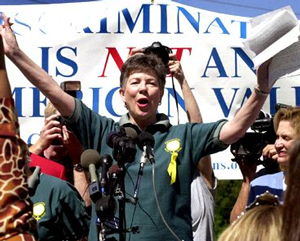
Former Secretary of State Condoleezza Rice and South Carolina financier and former banker Darla Moore have become the first female members in the club’s 80-year history.
Burk, who for the last nine years persisted in organizing to gain membership for women in the club that represents the pinnacle of power and influence, can finally, deservedly, celebrate success.
Burk explained the history in Women’s eNews last April when the august male-only golf club once again refused to let a woman wear its vaunted green members’ jacket at its annual Masters Tournament:
Well, the big day for the big boys at Augusta National Golf Club came and went without a woman showing up in the green jacket that denotes membership. The particular woman in question was Virginia Rometty, CEO of IBM, the leading corporate sponsor of Augusta’s Masters Golf Tournament.
For those who don’t follow news of puffed-up men chasing little balls around a green course, the club has always been male-only, and resisted extreme pressure nine years ago from women’s groups, led by the National Council of Women’s Organizations, to open up to female members.
The debate raged for nearly a year, complete with death threats to the NCWO chair, yours truly.
Much of the argument centered on whether the club had the “right to remain private” (translate “engage in discrimination at will”).
A secondary issue was the role of corporate sponsors in supporting the club’s exclusion of women and the statement that made about corporate values.
The newly kindled attention this year was due to IBM’s appointment of Rometty last January. IBM’s CEOs have always been accorded the green jacket. But IBM’s CEOs have always been male. What a difference a woman can make.
Though I’m not a golfer, as I explained here, I’m well aware of the social, political, and business significance of golfing.
Boardroom Golf Institute founder Joan Cavanaugh’s passion for the sport comes from her belief in the importance of women “getting into the game” literally and figuratively.
When I interviewed her for the post and revealed my dismal golf performance, she gave me and other women this advice, “Get in the game and then change the game, move up the ladder. Go where things are and make them yours.”
But you can’t get into the game if they won’t let you into the club.
And to get into the club—into any seat of power–women must first see themselves as worthy of it, second must aspire to it, and third must advocate for themselves to be in it.
That’s why I was so disappointed that Rometty failed to push for women members despite sponsorship of the Masters Tournament by the company she helms.
For while Augusta as a private club might have the legal right to discriminate, it was still very wrong for them to exclude women. In doing so, they kept women from accessing a main source of power in business: the human connections that are made when 300 of the nation’s most powerful business leaders bond on Augusta’s greens and in its clubhouse.
So why did the seemingly sudden but oh-so-long-in-coming change come after so many years of resistance? After all, there have been plenty of women well worthy of membership for many years, both for their golf prowess and their business clout.
And why did Augusta National chairman Billy Payne effuse, “This is a joyous occasion,” after being part of the resistance for who knows how long?
At least two of the No Excuses Power Tools came in handy for fomenting the change:
First, define your own terms and set the agenda. That’s what Burk did when she explained to the world, over and over, that this was about access to power and the power of access, not about golf.
Second, create a movement. Don’t be the lone voice; organize like-minded people to join with you, as Burk did in mobilizing the National Council of Women’s Organizations. Then, just like with civil rights lunch counter sit-ins 50 years ago and same sex marriage initiatives today, people all around gradually begin to see the injustice.
And when the weight of changing culture and public opinion reached its apex with the specter of Rometty being shut out, it became inevitable that the club wouldn’t just change its policy but would even feel like heroes for finally doing what is right.
We might as well praise them, as Boardroom Golf Institute’s Cavanaugh did when I asked for her reaction: “This concession is no longer a missed opportunity for men and women to contribute to each others game of play in business networking or in the success they desire for business and life.”
The remaining business will be to make sure Rice and Moore are not mere tokens. And to urge these two women who were admitted to the club to work inside of it to bring in more.
August 15, 2012
She’s Doing It: 5 Things Candy Crowley and Helen Gurley Brown Have in Common – and One Thing They Couldn’t
Aside from Vice Presidential candidate Paul Ryan’s frighteningly extreme position on Medicare, the top news this week has been all women all the time.
On Monday, August 13, the Commission on Presidential Debates announced that for the first time since Carole Simpson in 1992, a woman—CNN’s “State of the Union” host and chief political correspondent Candy Crowley—will moderate a presidential debate.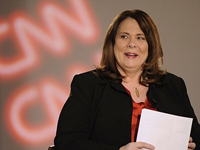
Crowley, 61, has won many awards for political reporting during stellar career. She graduated from Randolph-Macon Woman’s College—my friend Amy Litzenberger is sure that women find their voices in all-female college settings—and rose from a Washington DC radio newsroom assistant through the Associated Press and NBC ranks before joining CNN news in 1987. Along the way, she covered every presidential campaign and convention since Jimmy Carter.
On the same day Crowley’s selection was announced, Cosmopolitan Magazine’s iconic former editor-in-chief and the author of the 1962 game-changing best seller Sex and the Single Girl, Helen Gurley Brown, died in Manhattan at age 90.
 Brown’s New York Times front page obituary is in itself a statement of her significance in changing America’s sexual mores. She counseled women (and demonstrated herself) that they were entitled to enjoy sex with or without marriage, and she encouraged the use of feminine wiles in the service of one’s ambitions. Her signature tagline was “Good girls go to heaven. Bad girls go everywhere.” The Times obit describes her controversial posture:
Brown’s New York Times front page obituary is in itself a statement of her significance in changing America’s sexual mores. She counseled women (and demonstrated herself) that they were entitled to enjoy sex with or without marriage, and she encouraged the use of feminine wiles in the service of one’s ambitions. Her signature tagline was “Good girls go to heaven. Bad girls go everywhere.” The Times obit describes her controversial posture:
Ms. Brown routinely described herself as a feminist, but whether her work helped or hindered the cause of women’s liberation has been publicly debated for decades. It will doubtless be debated long after her death. What is safe to say is that she was a Janus-headed figure in women’s history, simultaneously progressive and retrogressive in her approach to women’s social roles.
When I heard the news about Gurley Brown, I thought: “If Margaret Sanger freed women from unintended pregnancy and Betty Friedan freed us from girdles, then Helen Gurley Brown freed women to enjoy orgasms as men had always done. RIP and thanks, Helen.”
And when I heard the news about Crowley, I cheered with a different kind of satisfaction. Not just because her appointment along with that of ABC’s Martha Raddatz, who will moderate the vice-presidential debate, marks the first time equal numbers of men and women will appear in these lead roles.
What thrilled me most about Crowley was that three 16-year-old New Jersey high school girls—Emma Axelrod, Sammi Siegel and Elena Tsemberis—started the petition that led to public debate about the lack of equal gender representation.
And that in turn forced the Debate Commission’s hand, despite their protests to the contrary. (Excuse my eye-roll, but those in power always have to say pressure played no part in their decisions, especially when it comes to gender.)
On a surface look at their lives and what they are known for, Crowley and Gurley Brown couldn’t be more different.
But there are five similarities that can teach leadership lessons to all of us:
Both women demonstrate courage in their pursuit of what they think is right. For Crowley, this is the best of journalistic tradition—to seek the facts and report them objectively, to ask the hard questions and not flinch from probing more deeply if a politician tries to obfuscate the answer. I call her an expert crap detector. Gurley similarly Brown had the courage to remodel her magazine as she thought would appeal to modern women. And she stuck by her controversial convictions about women’s right to sexual pleasure despite much pushback from feminists and conservatives alike.
Both women apply No Excuses Power Tool #3: Use what you’ve got. Both were denigrated early in their careers for not looking like the Barbie Princess model of female physical pulchritude. And both used their smarts and skills to parlay themselves to success. Gurley Brown invented the term “Mouseburger” to describe he own nondescript appearance, whereas Crowley has acknowledged that her weight has been an impediment. She overcame it, partially by losing some, but primarily by being so darn good at her job that others had to look beyond appearances.
Both women are groundbreakers in their fields. Gurley Brown led a moribund Cosmopolitan to resurgence, for good or ill, as the archetype modern women’s magazine that became a model for others to this day. Crowley’s groundbreaking first will happen when she moderates the presidential town hall October 16 at Hofstra University.
Both women are hard workers, giving long hours with laser focus on what they wanted to achieve. In neither case was fame or fortune handed to them on silver platters. They earned it the old fashioned way.
Both women demonstrate persistence. They never gave up in the face of criticism, whether of their physical appearance or their capabilities to handle the job. Gurley Brown held 17 different jobs before she got her dream job of editor-in-chief. Crowley’s career trajectory similarly shows a path of constant learning and moving up through the ranks to her current role.
Still, there is one distinct difference between Crowley and Gurley Brown. It is their generational context.
Gurley Brown’s focus on ownership of the body, including embracing one’s sexuality and sexual enjoyment, is an essential step along the path to full empowerment. By the time Crowley entered college, the birth control pill was readily available and no one questioned that a “single girl” could have both good sex and a good life.
The other essential step to power is financial independence—the ability to earn enough money to support oneself and one’s family.
By the time Crowley entered the journalism profession, women were still far from parity (even as we remain today), but the professional doors had been opened and ceilings were being shattered all around her, thanks to second wave feminist pioneers like Gloria Steinem, Florynce Kennedy, Bella Abzug, and Betty Friedan who broke ceilings and smashed discriminatory policies across all sectors.
I doubt that Helen Gurley Brown in her early years could even have imagined Candy Crowley, a journalist seasoned by a lifetime of serous political reporting and analysis, a journalist and, yes, a woman whose qualifying credentials for moderating a presidential debate can’t be questioned.
Marvelously, because of what both Gurley Brown and Crowley have achieved, the next generation has a completely different context. Those three 16-year old girls know gender equality is simple justice and figured out how to break ground for women in political media, not for Candy Crowley’s sake but for all the little girls who will be watching her.

